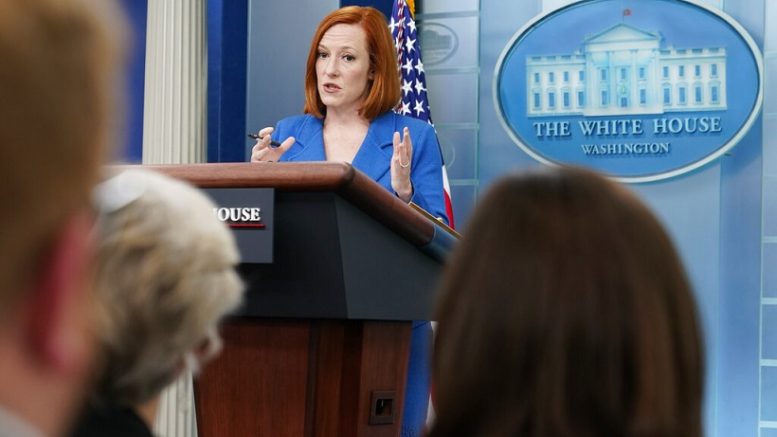WASHINGTON (AP) — Congress should provide the $22.5 billion President Joe Biden wants for continuing the battle against COVID-19 without cutting other programs to pay for it, senior administration officials said Monday.
And if Republicans continue to insist that additional federal efforts to combat the pandemic must be paid for by culling spending elsewhere, the GOP should specify what it wants to cut, the officials said.
The remarks came nearly two weeks after a new round of COVID-19 funding was pulled out of a $1.5 trillion government-wide measure after rank-and-file Democrats rejected cuts that party leaders had negotiated with Republicans to pay for it. Though Biden signed the overall bill into law, the deletion of the COVID-19 funds was a major setback for Biden and Democrats.
“Our concern right now is that we are going to run out of money to provide the types of vaccines, boosters, treatments to the immunocompromised, and others free of charge that will help to continue to battle” the pandemic, White House press secretary Jen Psaki said Monday.
Top House Democrats have said they believe they will have to find savings to pay for the additional spending to move legislation through Congress. The biggest hurdle would be in the Senate, where Democrats will need at least 10 GOP votes to reach the 60 votes needed to move the most significant bills to passage.
The White House has said the government is running out of funds for vaccines, testing, and treatments, even as Omicron variant BA.2, which is fueling a virus resurgence in Europe and Asia, is appearing increasingly in the U.S.
The senior administration officials said the government has bought the doses it would need to vaccinate children up to age 5. But they said they only have enough vaccines to administer a fourth shot — which drug makers are recommending for many people — to those with compromised immune systems.
The officials spoke only on the condition of anonymity as a requirement for reporters to participate in the telephone briefing.
Republicans say savings to pay for the new expenditures should be found from the trillions that Congress has already provided since the pandemic began two years ago. That includes a $1.9 trillion measure Democrats pushed through Congress over unanimous GOP opposition a year ago.
Asked about the administration officials’ comments, a spokesperson for Senate Minority Leader Mitch McConnell, R-Ky., referred a reporter to comments McConnell made on CBS’ “Face the Nation” on Sunday.
McConnell said Republicans would consider the administration’s request but said they should use “some of this massive amount that was spent last year that’s not out the door yet. So let’s take a look at how to pay for it, and then we’ll be happy to decide whether or not to support it.”
GOP leaders say the administration has not provided figures they’ve sought on how much money remains unspent. The administration officials in Monday’s call said they’ve repeatedly provided plentiful data on the subject, and said Republicans have agreed to not require savings to pay for past emergencies.
Only around $300 billion of last year’s $1.9 trillion COVID-19 relief measure remains unspent and not legally committed to a specific program or recipient, the administration officials said.
But around $240 billion of that has been promised to specific recipients like states and cities, who have built the amounts into their budgets, the administration officials said. The administration has held back some of the rest for emergencies, they said.
More than $100 billion of the money that’s so far unspent is for pandemic aid to state and local governments, and nearly that amount is for assistance to some pension plans, according to administration documents obtained by The Associated Press.
Biden’s pandemic spending request had been pared down to $15.6 billion as part of the compromise House bill. It would have been partly paid for by cutting billions in COVID-19 aid that last year’s bill had provided to 30 state governments but had not yet been sent to them.
Many Democrats refused to vote for the overall package until the cuts in state aid were removed, which House Speaker Nancy Pelosi, D-Calif., ultimately agreed to do. Top Republicans had demanded the savings in exchange for supporting the legislation, and Pelosi dropped all the COVID-19 spending after substitute cuts were not found.








































